Comprehensive Report: Education System of South Africa
VerifiedAdded on 2023/01/18
|10
|2950
|38
Report
AI Summary
This report provides a comprehensive analysis of the education system in South Africa, addressing the challenges and reforms implemented post-democracy. It examines the critical role of teacher quality, highlighting issues such as lack of content knowledge, poor teaching skills, and lack of accountability, and proposes the introduction of professional standards, improved teacher training, and monitoring. The report also discusses the impact of trade unions on the education system, exploring the conflicting positions on professionalism and the challenges of balancing worker demands with the need for educational improvement. It further identifies challenges like high dropout rates, resource inefficiencies, and the need for improved infrastructure and resources. The report recommends measures such as introducing professional standards, fostering a reading culture, merit-based teacher selection, and increasing teacher salaries to attract motivated graduates and improve the overall quality of education. The report references various sources to support its claims and provide a holistic overview of the education system in South Africa.
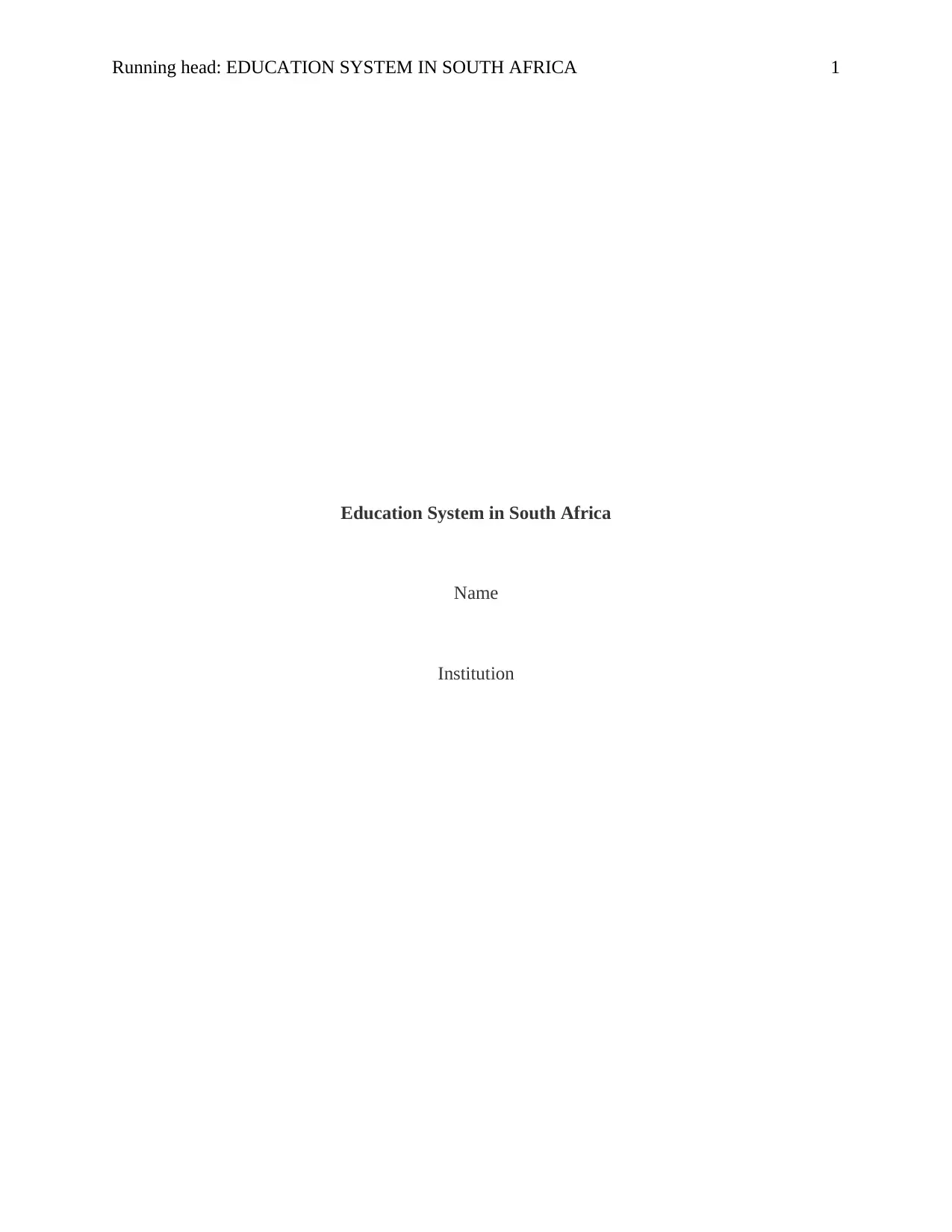
Running head: EDUCATION SYSTEM IN SOUTH AFRICA 1
Education System in South Africa
Name
Institution
Education System in South Africa
Name
Institution
Paraphrase This Document
Need a fresh take? Get an instant paraphrase of this document with our AI Paraphraser
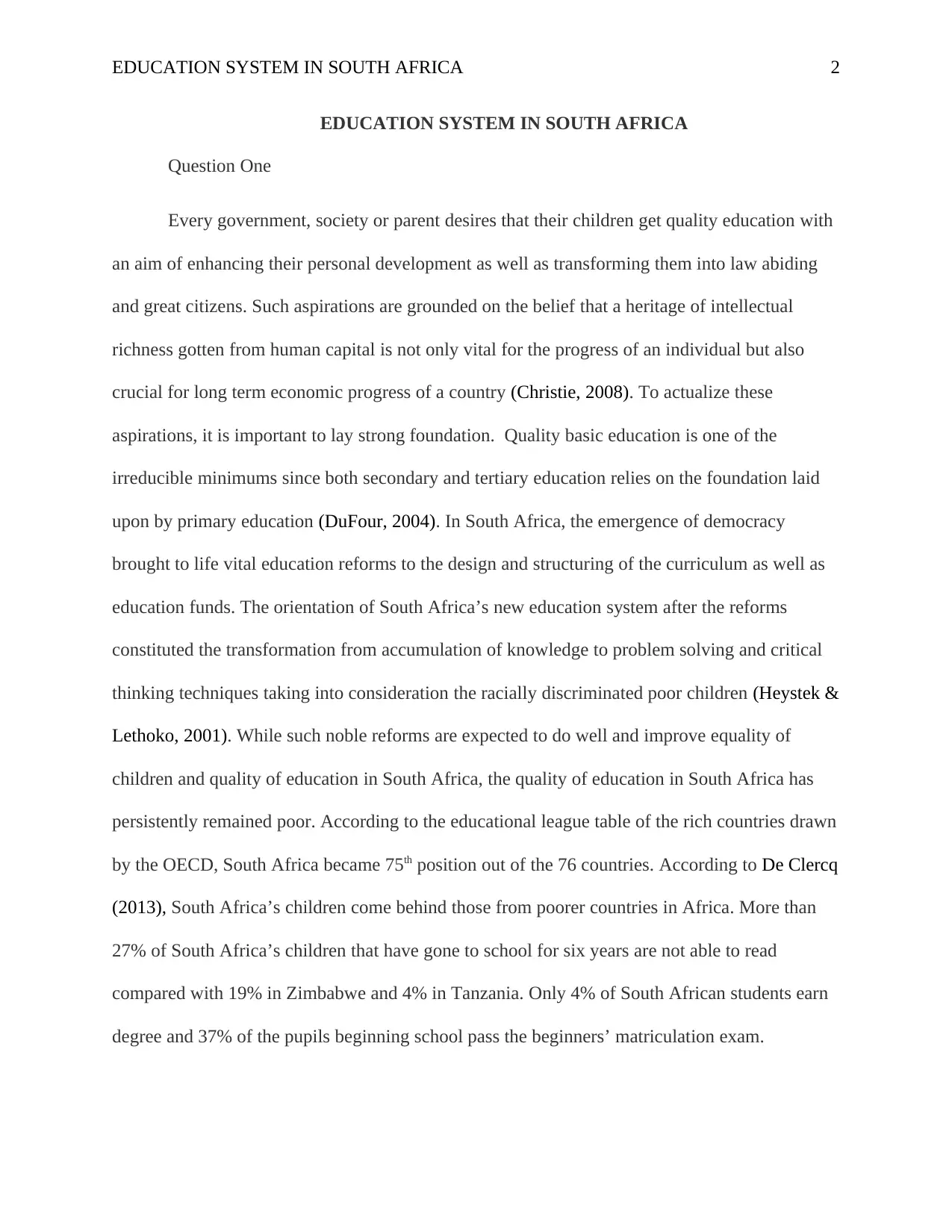
EDUCATION SYSTEM IN SOUTH AFRICA 2
EDUCATION SYSTEM IN SOUTH AFRICA
Question One
Every government, society or parent desires that their children get quality education with
an aim of enhancing their personal development as well as transforming them into law abiding
and great citizens. Such aspirations are grounded on the belief that a heritage of intellectual
richness gotten from human capital is not only vital for the progress of an individual but also
crucial for long term economic progress of a country (Christie, 2008). To actualize these
aspirations, it is important to lay strong foundation. Quality basic education is one of the
irreducible minimums since both secondary and tertiary education relies on the foundation laid
upon by primary education (DuFour, 2004). In South Africa, the emergence of democracy
brought to life vital education reforms to the design and structuring of the curriculum as well as
education funds. The orientation of South Africa’s new education system after the reforms
constituted the transformation from accumulation of knowledge to problem solving and critical
thinking techniques taking into consideration the racially discriminated poor children (Heystek &
Lethoko, 2001). While such noble reforms are expected to do well and improve equality of
children and quality of education in South Africa, the quality of education in South Africa has
persistently remained poor. According to the educational league table of the rich countries drawn
by the OECD, South Africa became 75th position out of the 76 countries. According to De Clercq
(2013), South Africa’s children come behind those from poorer countries in Africa. More than
27% of South Africa’s children that have gone to school for six years are not able to read
compared with 19% in Zimbabwe and 4% in Tanzania. Only 4% of South African students earn
degree and 37% of the pupils beginning school pass the beginners’ matriculation exam.
EDUCATION SYSTEM IN SOUTH AFRICA
Question One
Every government, society or parent desires that their children get quality education with
an aim of enhancing their personal development as well as transforming them into law abiding
and great citizens. Such aspirations are grounded on the belief that a heritage of intellectual
richness gotten from human capital is not only vital for the progress of an individual but also
crucial for long term economic progress of a country (Christie, 2008). To actualize these
aspirations, it is important to lay strong foundation. Quality basic education is one of the
irreducible minimums since both secondary and tertiary education relies on the foundation laid
upon by primary education (DuFour, 2004). In South Africa, the emergence of democracy
brought to life vital education reforms to the design and structuring of the curriculum as well as
education funds. The orientation of South Africa’s new education system after the reforms
constituted the transformation from accumulation of knowledge to problem solving and critical
thinking techniques taking into consideration the racially discriminated poor children (Heystek &
Lethoko, 2001). While such noble reforms are expected to do well and improve equality of
children and quality of education in South Africa, the quality of education in South Africa has
persistently remained poor. According to the educational league table of the rich countries drawn
by the OECD, South Africa became 75th position out of the 76 countries. According to De Clercq
(2013), South Africa’s children come behind those from poorer countries in Africa. More than
27% of South Africa’s children that have gone to school for six years are not able to read
compared with 19% in Zimbabwe and 4% in Tanzania. Only 4% of South African students earn
degree and 37% of the pupils beginning school pass the beginners’ matriculation exam.
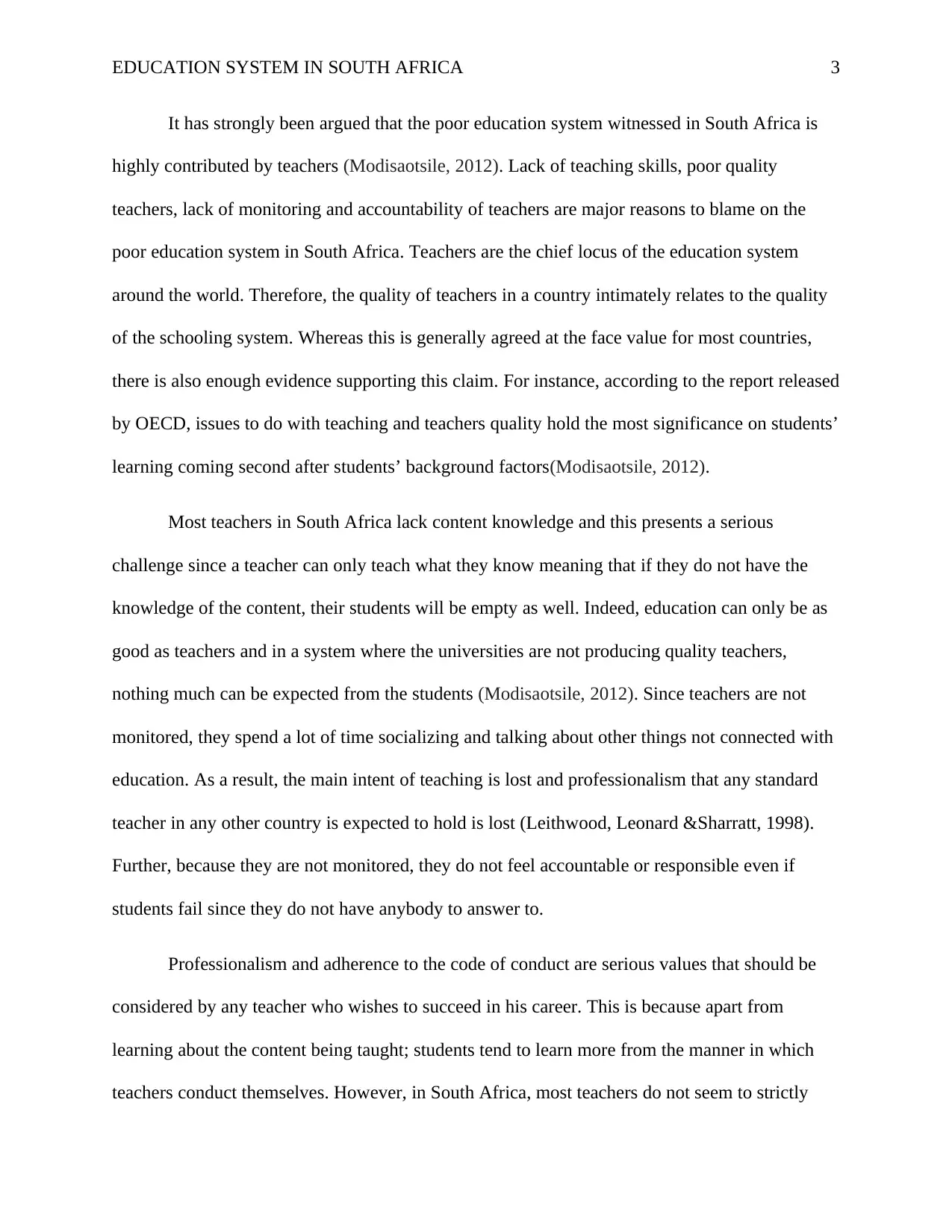
EDUCATION SYSTEM IN SOUTH AFRICA 3
It has strongly been argued that the poor education system witnessed in South Africa is
highly contributed by teachers (Modisaotsile, 2012). Lack of teaching skills, poor quality
teachers, lack of monitoring and accountability of teachers are major reasons to blame on the
poor education system in South Africa. Teachers are the chief locus of the education system
around the world. Therefore, the quality of teachers in a country intimately relates to the quality
of the schooling system. Whereas this is generally agreed at the face value for most countries,
there is also enough evidence supporting this claim. For instance, according to the report released
by OECD, issues to do with teaching and teachers quality hold the most significance on students’
learning coming second after students’ background factors(Modisaotsile, 2012).
Most teachers in South Africa lack content knowledge and this presents a serious
challenge since a teacher can only teach what they know meaning that if they do not have the
knowledge of the content, their students will be empty as well. Indeed, education can only be as
good as teachers and in a system where the universities are not producing quality teachers,
nothing much can be expected from the students (Modisaotsile, 2012). Since teachers are not
monitored, they spend a lot of time socializing and talking about other things not connected with
education. As a result, the main intent of teaching is lost and professionalism that any standard
teacher in any other country is expected to hold is lost (Leithwood, Leonard &Sharratt, 1998).
Further, because they are not monitored, they do not feel accountable or responsible even if
students fail since they do not have anybody to answer to.
Professionalism and adherence to the code of conduct are serious values that should be
considered by any teacher who wishes to succeed in his career. This is because apart from
learning about the content being taught; students tend to learn more from the manner in which
teachers conduct themselves. However, in South Africa, most teachers do not seem to strictly
It has strongly been argued that the poor education system witnessed in South Africa is
highly contributed by teachers (Modisaotsile, 2012). Lack of teaching skills, poor quality
teachers, lack of monitoring and accountability of teachers are major reasons to blame on the
poor education system in South Africa. Teachers are the chief locus of the education system
around the world. Therefore, the quality of teachers in a country intimately relates to the quality
of the schooling system. Whereas this is generally agreed at the face value for most countries,
there is also enough evidence supporting this claim. For instance, according to the report released
by OECD, issues to do with teaching and teachers quality hold the most significance on students’
learning coming second after students’ background factors(Modisaotsile, 2012).
Most teachers in South Africa lack content knowledge and this presents a serious
challenge since a teacher can only teach what they know meaning that if they do not have the
knowledge of the content, their students will be empty as well. Indeed, education can only be as
good as teachers and in a system where the universities are not producing quality teachers,
nothing much can be expected from the students (Modisaotsile, 2012). Since teachers are not
monitored, they spend a lot of time socializing and talking about other things not connected with
education. As a result, the main intent of teaching is lost and professionalism that any standard
teacher in any other country is expected to hold is lost (Leithwood, Leonard &Sharratt, 1998).
Further, because they are not monitored, they do not feel accountable or responsible even if
students fail since they do not have anybody to answer to.
Professionalism and adherence to the code of conduct are serious values that should be
considered by any teacher who wishes to succeed in his career. This is because apart from
learning about the content being taught; students tend to learn more from the manner in which
teachers conduct themselves. However, in South Africa, most teachers do not seem to strictly
⊘ This is a preview!⊘
Do you want full access?
Subscribe today to unlock all pages.

Trusted by 1+ million students worldwide
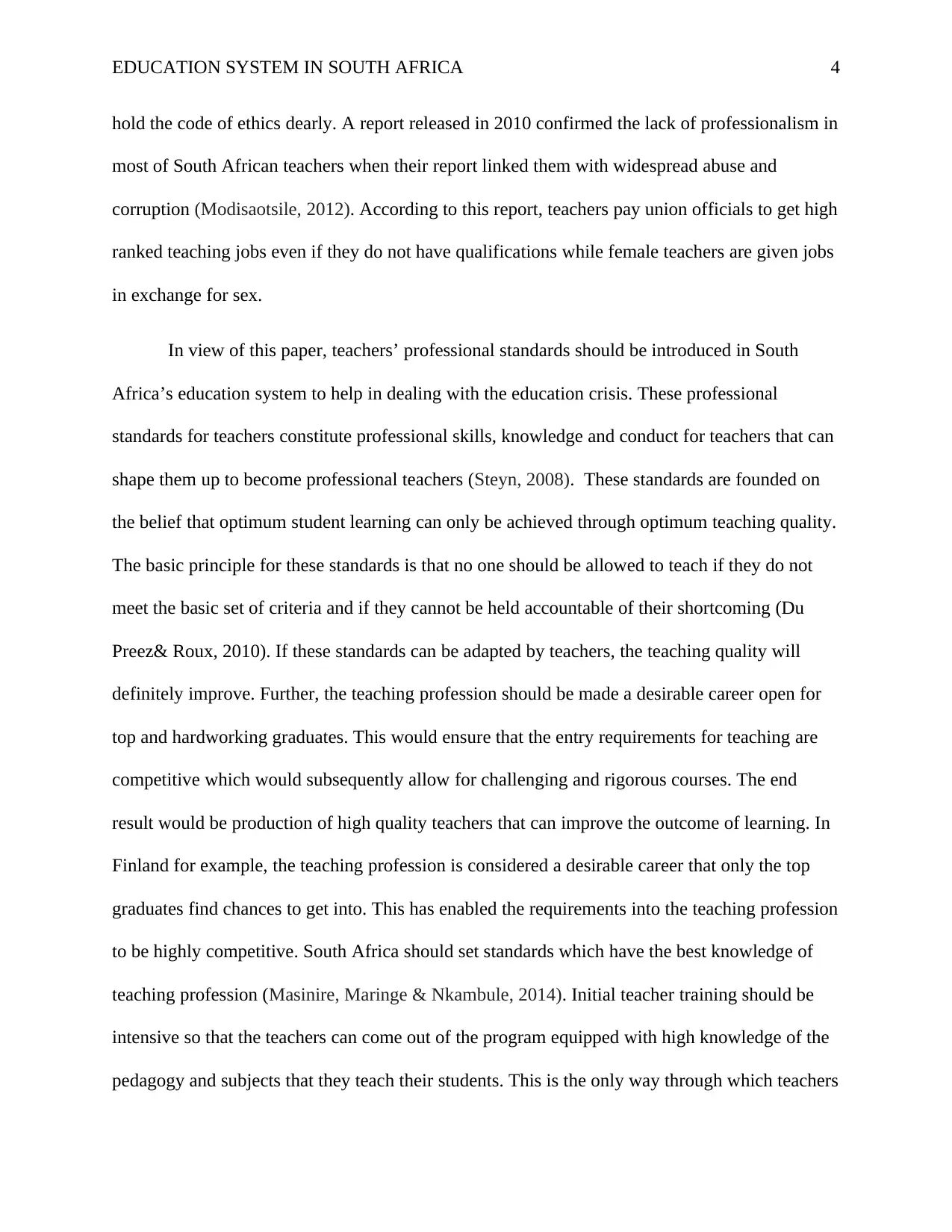
EDUCATION SYSTEM IN SOUTH AFRICA 4
hold the code of ethics dearly. A report released in 2010 confirmed the lack of professionalism in
most of South African teachers when their report linked them with widespread abuse and
corruption (Modisaotsile, 2012). According to this report, teachers pay union officials to get high
ranked teaching jobs even if they do not have qualifications while female teachers are given jobs
in exchange for sex.
In view of this paper, teachers’ professional standards should be introduced in South
Africa’s education system to help in dealing with the education crisis. These professional
standards for teachers constitute professional skills, knowledge and conduct for teachers that can
shape them up to become professional teachers (Steyn, 2008). These standards are founded on
the belief that optimum student learning can only be achieved through optimum teaching quality.
The basic principle for these standards is that no one should be allowed to teach if they do not
meet the basic set of criteria and if they cannot be held accountable of their shortcoming (Du
Preez& Roux, 2010). If these standards can be adapted by teachers, the teaching quality will
definitely improve. Further, the teaching profession should be made a desirable career open for
top and hardworking graduates. This would ensure that the entry requirements for teaching are
competitive which would subsequently allow for challenging and rigorous courses. The end
result would be production of high quality teachers that can improve the outcome of learning. In
Finland for example, the teaching profession is considered a desirable career that only the top
graduates find chances to get into. This has enabled the requirements into the teaching profession
to be highly competitive. South Africa should set standards which have the best knowledge of
teaching profession (Masinire, Maringe & Nkambule, 2014). Initial teacher training should be
intensive so that the teachers can come out of the program equipped with high knowledge of the
pedagogy and subjects that they teach their students. This is the only way through which teachers
hold the code of ethics dearly. A report released in 2010 confirmed the lack of professionalism in
most of South African teachers when their report linked them with widespread abuse and
corruption (Modisaotsile, 2012). According to this report, teachers pay union officials to get high
ranked teaching jobs even if they do not have qualifications while female teachers are given jobs
in exchange for sex.
In view of this paper, teachers’ professional standards should be introduced in South
Africa’s education system to help in dealing with the education crisis. These professional
standards for teachers constitute professional skills, knowledge and conduct for teachers that can
shape them up to become professional teachers (Steyn, 2008). These standards are founded on
the belief that optimum student learning can only be achieved through optimum teaching quality.
The basic principle for these standards is that no one should be allowed to teach if they do not
meet the basic set of criteria and if they cannot be held accountable of their shortcoming (Du
Preez& Roux, 2010). If these standards can be adapted by teachers, the teaching quality will
definitely improve. Further, the teaching profession should be made a desirable career open for
top and hardworking graduates. This would ensure that the entry requirements for teaching are
competitive which would subsequently allow for challenging and rigorous courses. The end
result would be production of high quality teachers that can improve the outcome of learning. In
Finland for example, the teaching profession is considered a desirable career that only the top
graduates find chances to get into. This has enabled the requirements into the teaching profession
to be highly competitive. South Africa should set standards which have the best knowledge of
teaching profession (Masinire, Maringe & Nkambule, 2014). Initial teacher training should be
intensive so that the teachers can come out of the program equipped with high knowledge of the
pedagogy and subjects that they teach their students. This is the only way through which teachers
Paraphrase This Document
Need a fresh take? Get an instant paraphrase of this document with our AI Paraphraser
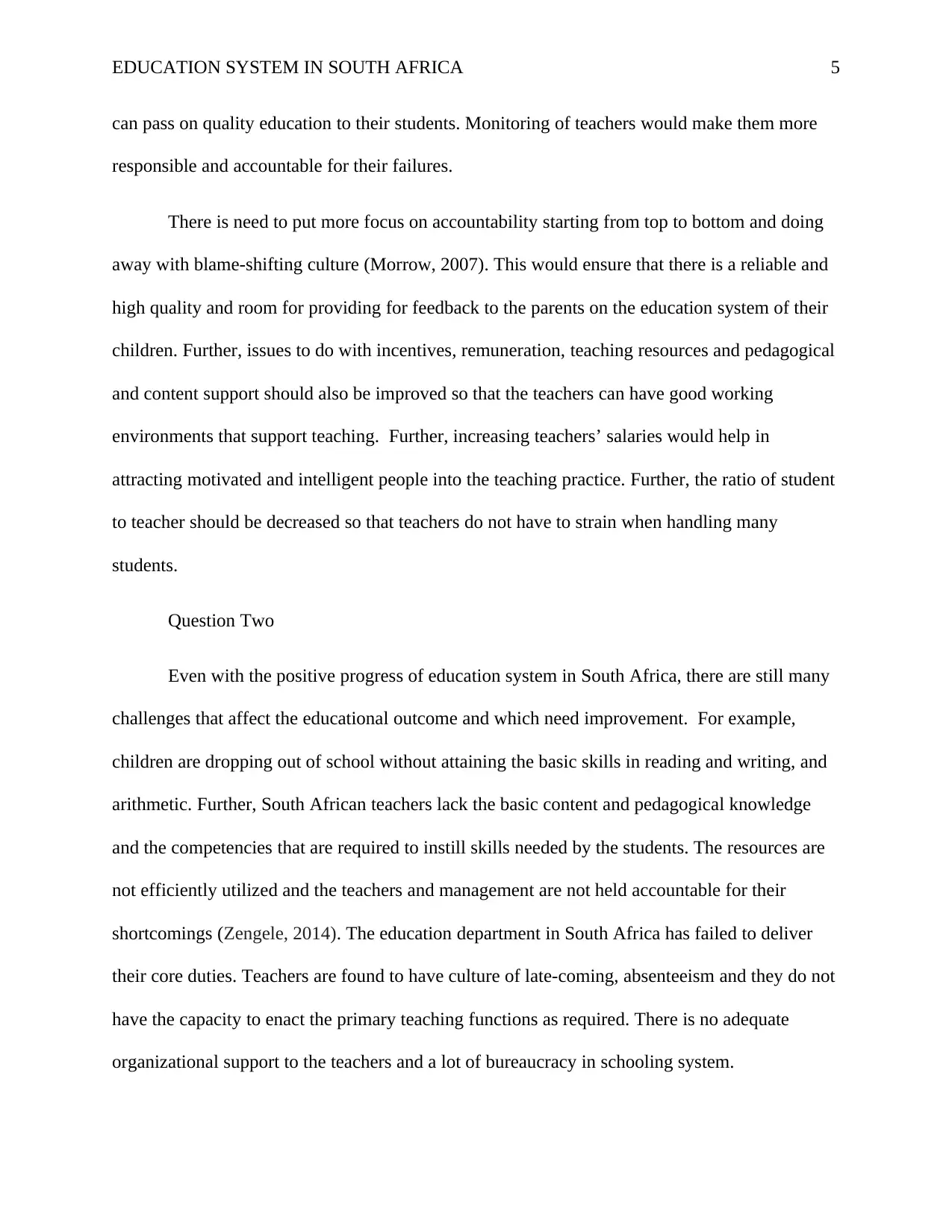
EDUCATION SYSTEM IN SOUTH AFRICA 5
can pass on quality education to their students. Monitoring of teachers would make them more
responsible and accountable for their failures.
There is need to put more focus on accountability starting from top to bottom and doing
away with blame-shifting culture (Morrow, 2007). This would ensure that there is a reliable and
high quality and room for providing for feedback to the parents on the education system of their
children. Further, issues to do with incentives, remuneration, teaching resources and pedagogical
and content support should also be improved so that the teachers can have good working
environments that support teaching. Further, increasing teachers’ salaries would help in
attracting motivated and intelligent people into the teaching practice. Further, the ratio of student
to teacher should be decreased so that teachers do not have to strain when handling many
students.
Question Two
Even with the positive progress of education system in South Africa, there are still many
challenges that affect the educational outcome and which need improvement. For example,
children are dropping out of school without attaining the basic skills in reading and writing, and
arithmetic. Further, South African teachers lack the basic content and pedagogical knowledge
and the competencies that are required to instill skills needed by the students. The resources are
not efficiently utilized and the teachers and management are not held accountable for their
shortcomings (Zengele, 2014). The education department in South Africa has failed to deliver
their core duties. Teachers are found to have culture of late-coming, absenteeism and they do not
have the capacity to enact the primary teaching functions as required. There is no adequate
organizational support to the teachers and a lot of bureaucracy in schooling system.
can pass on quality education to their students. Monitoring of teachers would make them more
responsible and accountable for their failures.
There is need to put more focus on accountability starting from top to bottom and doing
away with blame-shifting culture (Morrow, 2007). This would ensure that there is a reliable and
high quality and room for providing for feedback to the parents on the education system of their
children. Further, issues to do with incentives, remuneration, teaching resources and pedagogical
and content support should also be improved so that the teachers can have good working
environments that support teaching. Further, increasing teachers’ salaries would help in
attracting motivated and intelligent people into the teaching practice. Further, the ratio of student
to teacher should be decreased so that teachers do not have to strain when handling many
students.
Question Two
Even with the positive progress of education system in South Africa, there are still many
challenges that affect the educational outcome and which need improvement. For example,
children are dropping out of school without attaining the basic skills in reading and writing, and
arithmetic. Further, South African teachers lack the basic content and pedagogical knowledge
and the competencies that are required to instill skills needed by the students. The resources are
not efficiently utilized and the teachers and management are not held accountable for their
shortcomings (Zengele, 2014). The education department in South Africa has failed to deliver
their core duties. Teachers are found to have culture of late-coming, absenteeism and they do not
have the capacity to enact the primary teaching functions as required. There is no adequate
organizational support to the teachers and a lot of bureaucracy in schooling system.
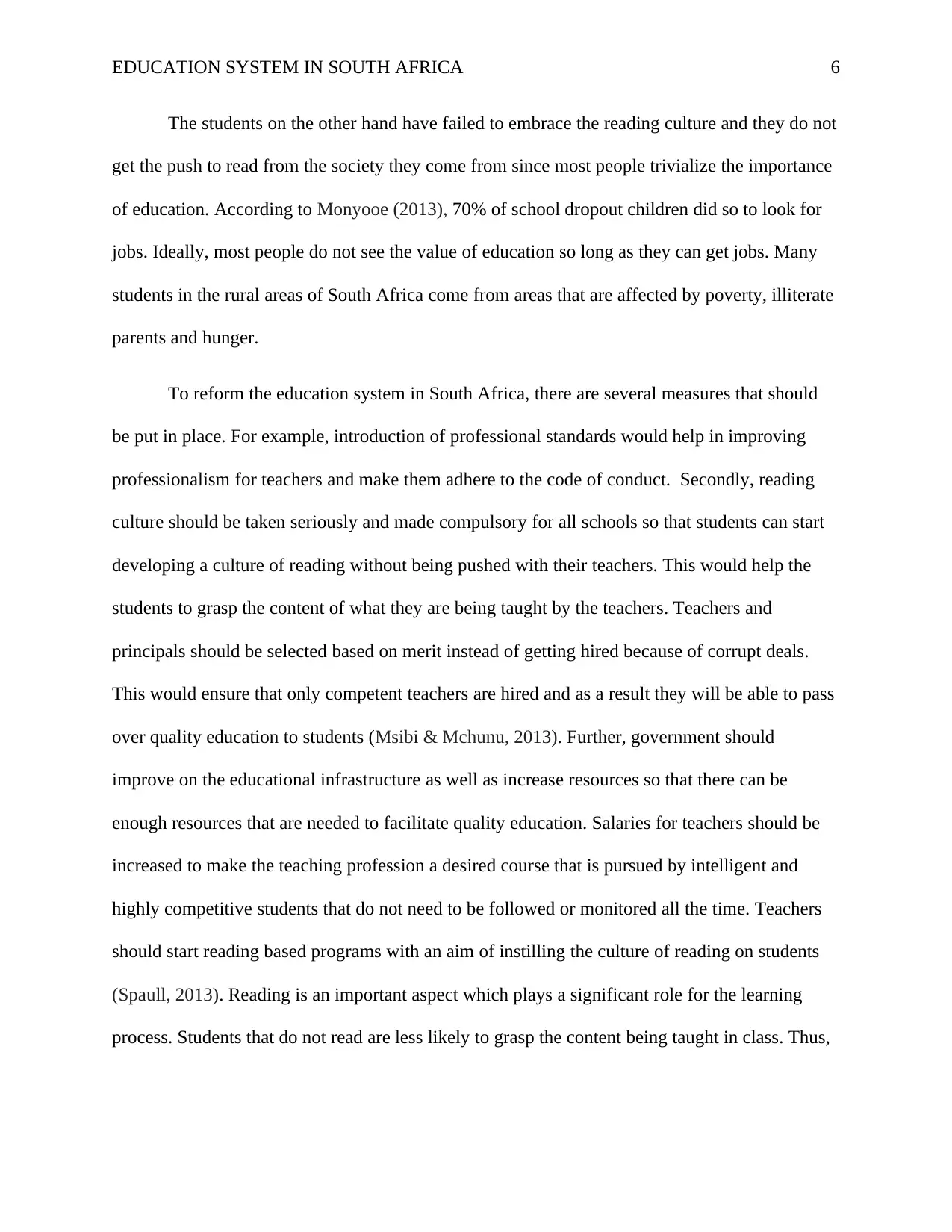
EDUCATION SYSTEM IN SOUTH AFRICA 6
The students on the other hand have failed to embrace the reading culture and they do not
get the push to read from the society they come from since most people trivialize the importance
of education. According to Monyooe (2013), 70% of school dropout children did so to look for
jobs. Ideally, most people do not see the value of education so long as they can get jobs. Many
students in the rural areas of South Africa come from areas that are affected by poverty, illiterate
parents and hunger.
To reform the education system in South Africa, there are several measures that should
be put in place. For example, introduction of professional standards would help in improving
professionalism for teachers and make them adhere to the code of conduct. Secondly, reading
culture should be taken seriously and made compulsory for all schools so that students can start
developing a culture of reading without being pushed with their teachers. This would help the
students to grasp the content of what they are being taught by the teachers. Teachers and
principals should be selected based on merit instead of getting hired because of corrupt deals.
This would ensure that only competent teachers are hired and as a result they will be able to pass
over quality education to students (Msibi & Mchunu, 2013). Further, government should
improve on the educational infrastructure as well as increase resources so that there can be
enough resources that are needed to facilitate quality education. Salaries for teachers should be
increased to make the teaching profession a desired course that is pursued by intelligent and
highly competitive students that do not need to be followed or monitored all the time. Teachers
should start reading based programs with an aim of instilling the culture of reading on students
(Spaull, 2013). Reading is an important aspect which plays a significant role for the learning
process. Students that do not read are less likely to grasp the content being taught in class. Thus,
The students on the other hand have failed to embrace the reading culture and they do not
get the push to read from the society they come from since most people trivialize the importance
of education. According to Monyooe (2013), 70% of school dropout children did so to look for
jobs. Ideally, most people do not see the value of education so long as they can get jobs. Many
students in the rural areas of South Africa come from areas that are affected by poverty, illiterate
parents and hunger.
To reform the education system in South Africa, there are several measures that should
be put in place. For example, introduction of professional standards would help in improving
professionalism for teachers and make them adhere to the code of conduct. Secondly, reading
culture should be taken seriously and made compulsory for all schools so that students can start
developing a culture of reading without being pushed with their teachers. This would help the
students to grasp the content of what they are being taught by the teachers. Teachers and
principals should be selected based on merit instead of getting hired because of corrupt deals.
This would ensure that only competent teachers are hired and as a result they will be able to pass
over quality education to students (Msibi & Mchunu, 2013). Further, government should
improve on the educational infrastructure as well as increase resources so that there can be
enough resources that are needed to facilitate quality education. Salaries for teachers should be
increased to make the teaching profession a desired course that is pursued by intelligent and
highly competitive students that do not need to be followed or monitored all the time. Teachers
should start reading based programs with an aim of instilling the culture of reading on students
(Spaull, 2013). Reading is an important aspect which plays a significant role for the learning
process. Students that do not read are less likely to grasp the content being taught in class. Thus,
⊘ This is a preview!⊘
Do you want full access?
Subscribe today to unlock all pages.

Trusted by 1+ million students worldwide
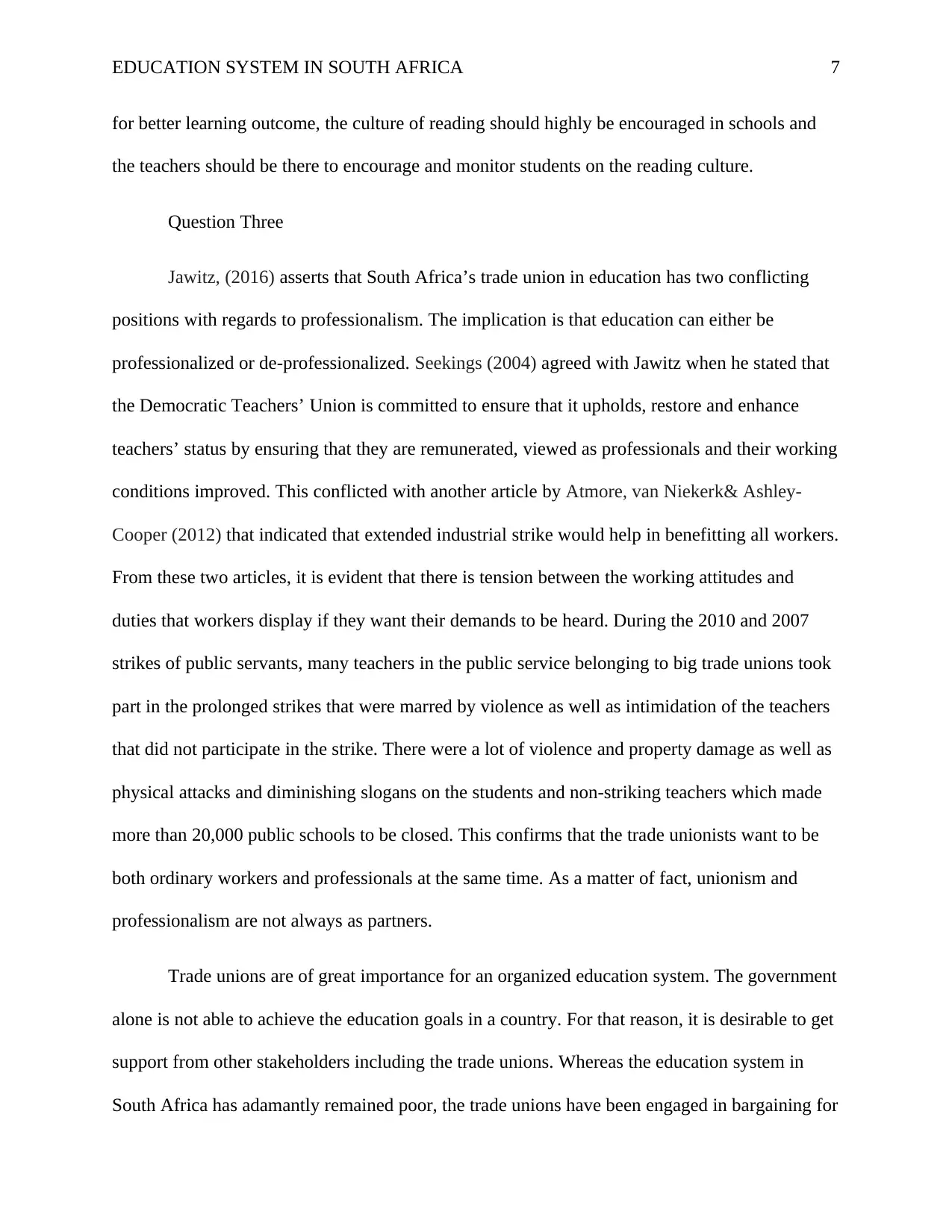
EDUCATION SYSTEM IN SOUTH AFRICA 7
for better learning outcome, the culture of reading should highly be encouraged in schools and
the teachers should be there to encourage and monitor students on the reading culture.
Question Three
Jawitz, (2016) asserts that South Africa’s trade union in education has two conflicting
positions with regards to professionalism. The implication is that education can either be
professionalized or de-professionalized. Seekings (2004) agreed with Jawitz when he stated that
the Democratic Teachers’ Union is committed to ensure that it upholds, restore and enhance
teachers’ status by ensuring that they are remunerated, viewed as professionals and their working
conditions improved. This conflicted with another article by Atmore, van Niekerk& Ashley-
Cooper (2012) that indicated that extended industrial strike would help in benefitting all workers.
From these two articles, it is evident that there is tension between the working attitudes and
duties that workers display if they want their demands to be heard. During the 2010 and 2007
strikes of public servants, many teachers in the public service belonging to big trade unions took
part in the prolonged strikes that were marred by violence as well as intimidation of the teachers
that did not participate in the strike. There were a lot of violence and property damage as well as
physical attacks and diminishing slogans on the students and non-striking teachers which made
more than 20,000 public schools to be closed. This confirms that the trade unionists want to be
both ordinary workers and professionals at the same time. As a matter of fact, unionism and
professionalism are not always as partners.
Trade unions are of great importance for an organized education system. The government
alone is not able to achieve the education goals in a country. For that reason, it is desirable to get
support from other stakeholders including the trade unions. Whereas the education system in
South Africa has adamantly remained poor, the trade unions have been engaged in bargaining for
for better learning outcome, the culture of reading should highly be encouraged in schools and
the teachers should be there to encourage and monitor students on the reading culture.
Question Three
Jawitz, (2016) asserts that South Africa’s trade union in education has two conflicting
positions with regards to professionalism. The implication is that education can either be
professionalized or de-professionalized. Seekings (2004) agreed with Jawitz when he stated that
the Democratic Teachers’ Union is committed to ensure that it upholds, restore and enhance
teachers’ status by ensuring that they are remunerated, viewed as professionals and their working
conditions improved. This conflicted with another article by Atmore, van Niekerk& Ashley-
Cooper (2012) that indicated that extended industrial strike would help in benefitting all workers.
From these two articles, it is evident that there is tension between the working attitudes and
duties that workers display if they want their demands to be heard. During the 2010 and 2007
strikes of public servants, many teachers in the public service belonging to big trade unions took
part in the prolonged strikes that were marred by violence as well as intimidation of the teachers
that did not participate in the strike. There were a lot of violence and property damage as well as
physical attacks and diminishing slogans on the students and non-striking teachers which made
more than 20,000 public schools to be closed. This confirms that the trade unionists want to be
both ordinary workers and professionals at the same time. As a matter of fact, unionism and
professionalism are not always as partners.
Trade unions are of great importance for an organized education system. The government
alone is not able to achieve the education goals in a country. For that reason, it is desirable to get
support from other stakeholders including the trade unions. Whereas the education system in
South Africa has adamantly remained poor, the trade unions have been engaged in bargaining for
Paraphrase This Document
Need a fresh take? Get an instant paraphrase of this document with our AI Paraphraser
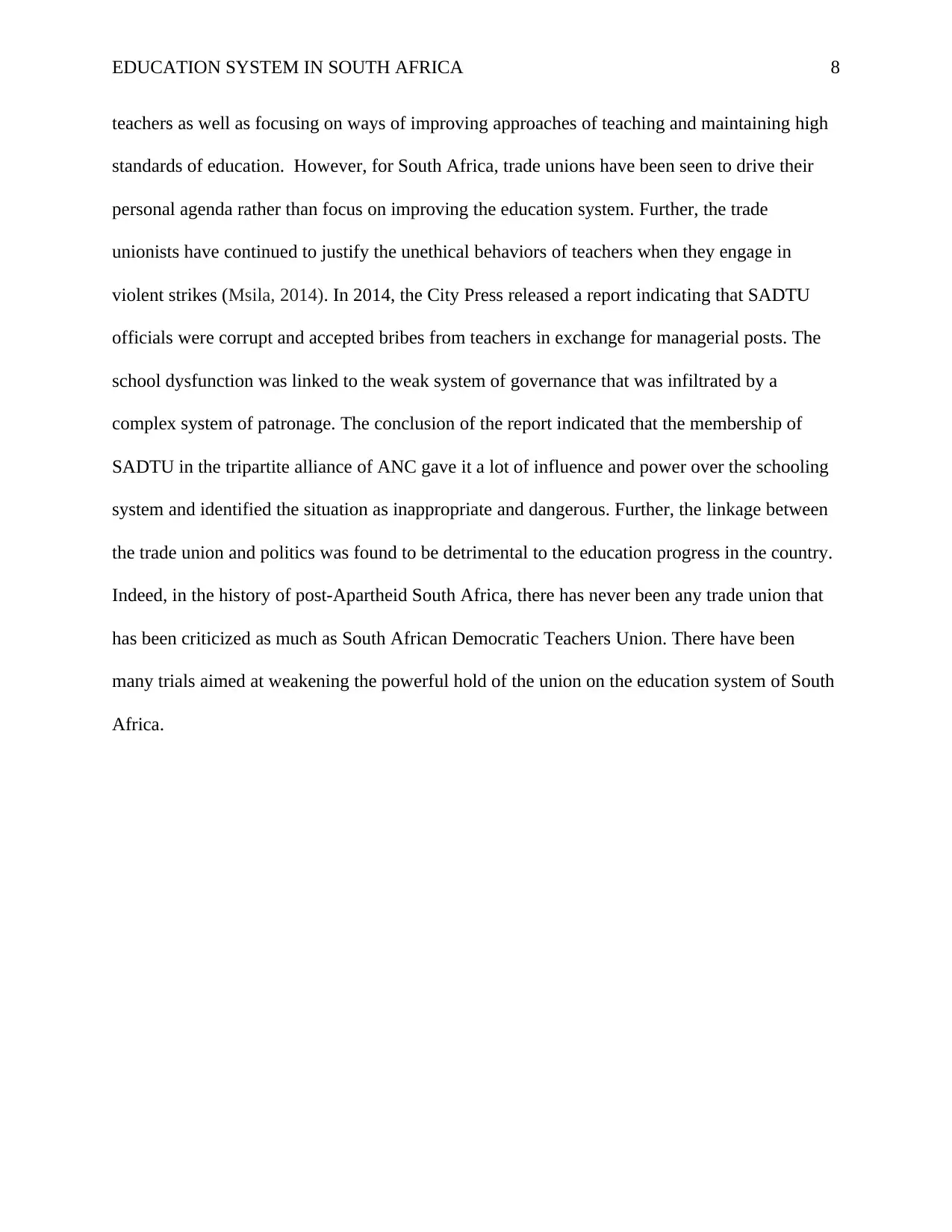
EDUCATION SYSTEM IN SOUTH AFRICA 8
teachers as well as focusing on ways of improving approaches of teaching and maintaining high
standards of education. However, for South Africa, trade unions have been seen to drive their
personal agenda rather than focus on improving the education system. Further, the trade
unionists have continued to justify the unethical behaviors of teachers when they engage in
violent strikes (Msila, 2014). In 2014, the City Press released a report indicating that SADTU
officials were corrupt and accepted bribes from teachers in exchange for managerial posts. The
school dysfunction was linked to the weak system of governance that was infiltrated by a
complex system of patronage. The conclusion of the report indicated that the membership of
SADTU in the tripartite alliance of ANC gave it a lot of influence and power over the schooling
system and identified the situation as inappropriate and dangerous. Further, the linkage between
the trade union and politics was found to be detrimental to the education progress in the country.
Indeed, in the history of post-Apartheid South Africa, there has never been any trade union that
has been criticized as much as South African Democratic Teachers Union. There have been
many trials aimed at weakening the powerful hold of the union on the education system of South
Africa.
teachers as well as focusing on ways of improving approaches of teaching and maintaining high
standards of education. However, for South Africa, trade unions have been seen to drive their
personal agenda rather than focus on improving the education system. Further, the trade
unionists have continued to justify the unethical behaviors of teachers when they engage in
violent strikes (Msila, 2014). In 2014, the City Press released a report indicating that SADTU
officials were corrupt and accepted bribes from teachers in exchange for managerial posts. The
school dysfunction was linked to the weak system of governance that was infiltrated by a
complex system of patronage. The conclusion of the report indicated that the membership of
SADTU in the tripartite alliance of ANC gave it a lot of influence and power over the schooling
system and identified the situation as inappropriate and dangerous. Further, the linkage between
the trade union and politics was found to be detrimental to the education progress in the country.
Indeed, in the history of post-Apartheid South Africa, there has never been any trade union that
has been criticized as much as South African Democratic Teachers Union. There have been
many trials aimed at weakening the powerful hold of the union on the education system of South
Africa.
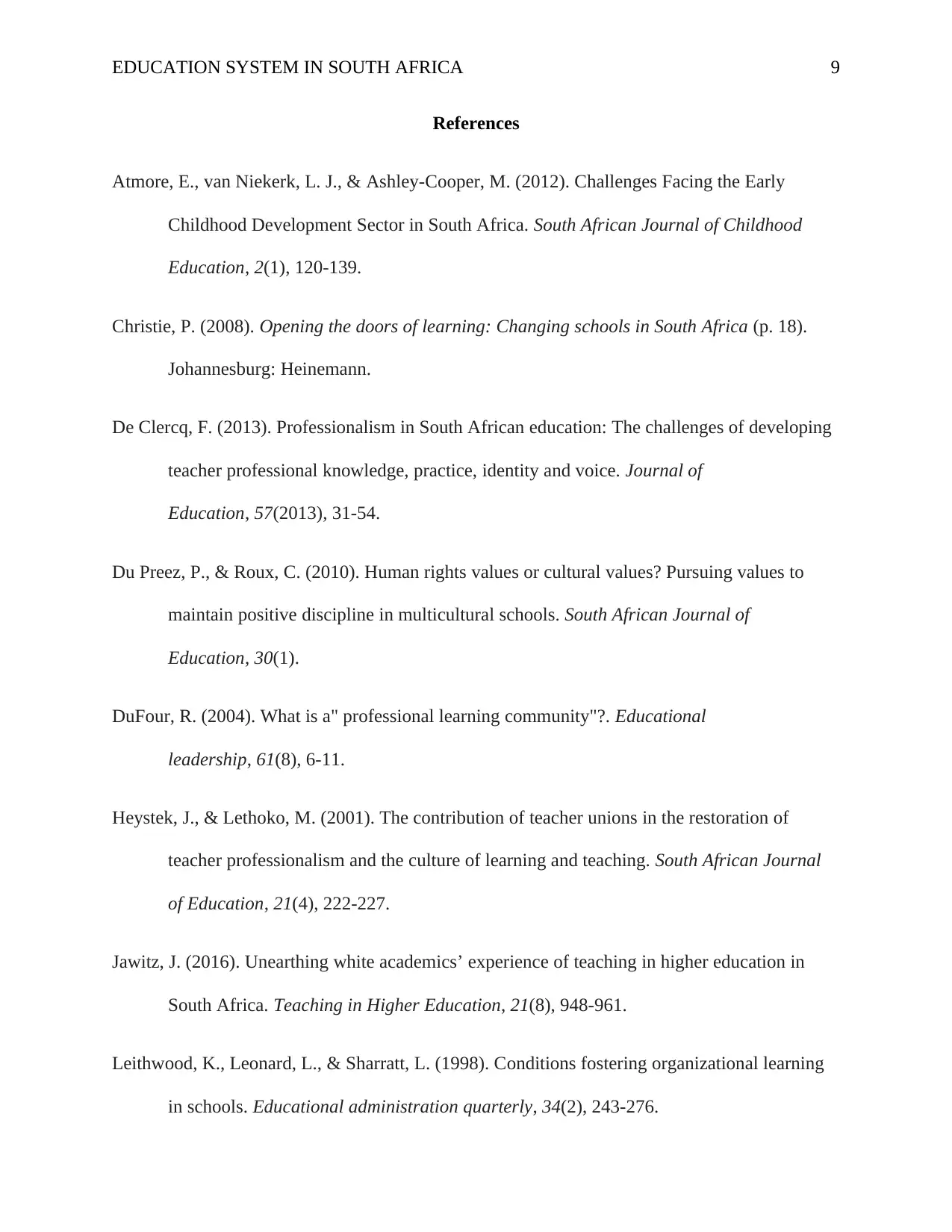
EDUCATION SYSTEM IN SOUTH AFRICA 9
References
Atmore, E., van Niekerk, L. J., & Ashley-Cooper, M. (2012). Challenges Facing the Early
Childhood Development Sector in South Africa. South African Journal of Childhood
Education, 2(1), 120-139.
Christie, P. (2008). Opening the doors of learning: Changing schools in South Africa (p. 18).
Johannesburg: Heinemann.
De Clercq, F. (2013). Professionalism in South African education: The challenges of developing
teacher professional knowledge, practice, identity and voice. Journal of
Education, 57(2013), 31-54.
Du Preez, P., & Roux, C. (2010). Human rights values or cultural values? Pursuing values to
maintain positive discipline in multicultural schools. South African Journal of
Education, 30(1).
DuFour, R. (2004). What is a" professional learning community"?. Educational
leadership, 61(8), 6-11.
Heystek, J., & Lethoko, M. (2001). The contribution of teacher unions in the restoration of
teacher professionalism and the culture of learning and teaching. South African Journal
of Education, 21(4), 222-227.
Jawitz, J. (2016). Unearthing white academics’ experience of teaching in higher education in
South Africa. Teaching in Higher Education, 21(8), 948-961.
Leithwood, K., Leonard, L., & Sharratt, L. (1998). Conditions fostering organizational learning
in schools. Educational administration quarterly, 34(2), 243-276.
References
Atmore, E., van Niekerk, L. J., & Ashley-Cooper, M. (2012). Challenges Facing the Early
Childhood Development Sector in South Africa. South African Journal of Childhood
Education, 2(1), 120-139.
Christie, P. (2008). Opening the doors of learning: Changing schools in South Africa (p. 18).
Johannesburg: Heinemann.
De Clercq, F. (2013). Professionalism in South African education: The challenges of developing
teacher professional knowledge, practice, identity and voice. Journal of
Education, 57(2013), 31-54.
Du Preez, P., & Roux, C. (2010). Human rights values or cultural values? Pursuing values to
maintain positive discipline in multicultural schools. South African Journal of
Education, 30(1).
DuFour, R. (2004). What is a" professional learning community"?. Educational
leadership, 61(8), 6-11.
Heystek, J., & Lethoko, M. (2001). The contribution of teacher unions in the restoration of
teacher professionalism and the culture of learning and teaching. South African Journal
of Education, 21(4), 222-227.
Jawitz, J. (2016). Unearthing white academics’ experience of teaching in higher education in
South Africa. Teaching in Higher Education, 21(8), 948-961.
Leithwood, K., Leonard, L., & Sharratt, L. (1998). Conditions fostering organizational learning
in schools. Educational administration quarterly, 34(2), 243-276.
⊘ This is a preview!⊘
Do you want full access?
Subscribe today to unlock all pages.

Trusted by 1+ million students worldwide
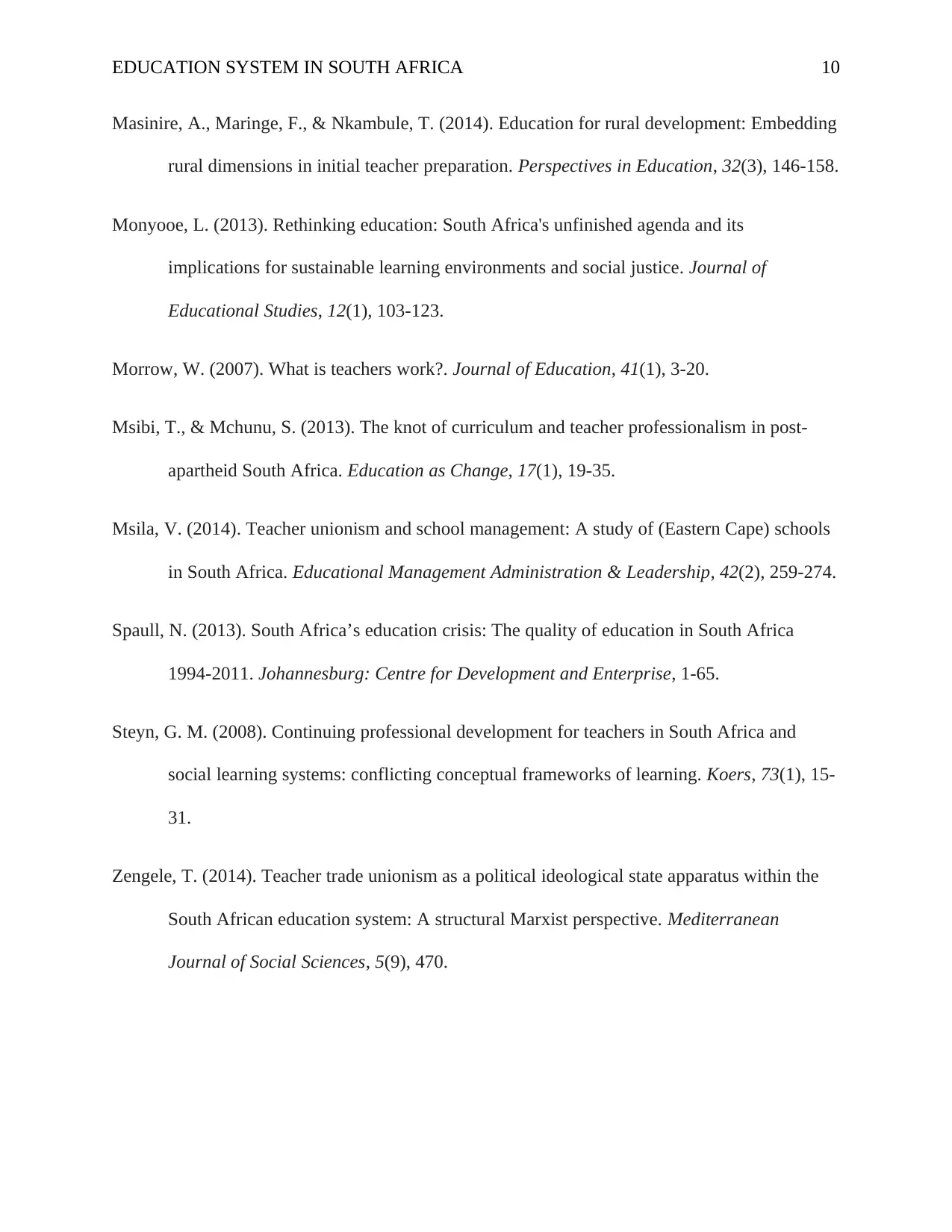
EDUCATION SYSTEM IN SOUTH AFRICA 10
Masinire, A., Maringe, F., & Nkambule, T. (2014). Education for rural development: Embedding
rural dimensions in initial teacher preparation. Perspectives in Education, 32(3), 146-158.
Monyooe, L. (2013). Rethinking education: South Africa's unfinished agenda and its
implications for sustainable learning environments and social justice. Journal of
Educational Studies, 12(1), 103-123.
Morrow, W. (2007). What is teachers work?. Journal of Education, 41(1), 3-20.
Msibi, T., & Mchunu, S. (2013). The knot of curriculum and teacher professionalism in post-
apartheid South Africa. Education as Change, 17(1), 19-35.
Msila, V. (2014). Teacher unionism and school management: A study of (Eastern Cape) schools
in South Africa. Educational Management Administration & Leadership, 42(2), 259-274.
Spaull, N. (2013). South Africa’s education crisis: The quality of education in South Africa
1994-2011. Johannesburg: Centre for Development and Enterprise, 1-65.
Steyn, G. M. (2008). Continuing professional development for teachers in South Africa and
social learning systems: conflicting conceptual frameworks of learning. Koers, 73(1), 15-
31.
Zengele, T. (2014). Teacher trade unionism as a political ideological state apparatus within the
South African education system: A structural Marxist perspective. Mediterranean
Journal of Social Sciences, 5(9), 470.
Masinire, A., Maringe, F., & Nkambule, T. (2014). Education for rural development: Embedding
rural dimensions in initial teacher preparation. Perspectives in Education, 32(3), 146-158.
Monyooe, L. (2013). Rethinking education: South Africa's unfinished agenda and its
implications for sustainable learning environments and social justice. Journal of
Educational Studies, 12(1), 103-123.
Morrow, W. (2007). What is teachers work?. Journal of Education, 41(1), 3-20.
Msibi, T., & Mchunu, S. (2013). The knot of curriculum and teacher professionalism in post-
apartheid South Africa. Education as Change, 17(1), 19-35.
Msila, V. (2014). Teacher unionism and school management: A study of (Eastern Cape) schools
in South Africa. Educational Management Administration & Leadership, 42(2), 259-274.
Spaull, N. (2013). South Africa’s education crisis: The quality of education in South Africa
1994-2011. Johannesburg: Centre for Development and Enterprise, 1-65.
Steyn, G. M. (2008). Continuing professional development for teachers in South Africa and
social learning systems: conflicting conceptual frameworks of learning. Koers, 73(1), 15-
31.
Zengele, T. (2014). Teacher trade unionism as a political ideological state apparatus within the
South African education system: A structural Marxist perspective. Mediterranean
Journal of Social Sciences, 5(9), 470.
1 out of 10
Related Documents
Your All-in-One AI-Powered Toolkit for Academic Success.
+13062052269
info@desklib.com
Available 24*7 on WhatsApp / Email
![[object Object]](/_next/static/media/star-bottom.7253800d.svg)
Unlock your academic potential
Copyright © 2020–2026 A2Z Services. All Rights Reserved. Developed and managed by ZUCOL.





